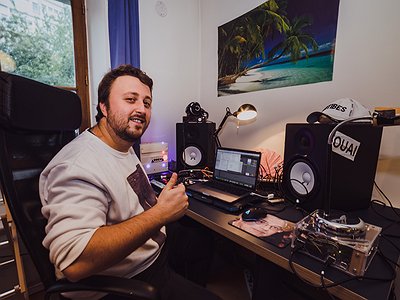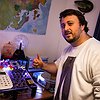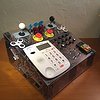Part 1
Name: Ouai Stéphane
Nationality: French
Occupation: DJ, producer
Current Release: 'Ché Pas' EP on Global Warmings
Recommendations: I could put some music I often listen to but since this interview was a really interesting talk around sound and music, I'll share with you a piece I really appreciate, especially for it’s concept.
It's a performance by Alvin Lucifer called I Am Sitting In A Room.
The idea is to record sound that comes out of the speaker and play it back through the same speaker on and on again. What it pinpoints are the natural frequencies of the room. Anyway listen to it, you'll get it, it's not too complicated. Don't listen to the full thing, you might go crazy. By the way, my track “Ché Pas” was directly influenced by this piece of music. Lucifer is using his speech in a literal way: he's saying what he's doing.
Another thing I want to share is a paper by Denis Smalley on a term he invented called “Spectromorphology” which is the perceived footprint of a sound over time. I'm still trying to understand the full paper, some parts are not so easy to cop on. But just the idea to think about sound changing its timbre overtime is interesting!
If you enjoyed this interview with Ouai Stéphane, visit his soundcloud page or facebook profile for more information and music. You can also buy his records over at bandcamp.
When did you start writing/producing music - and what or who were your early passions and influences? What is about music and/or sound that drew you to it?
I started my music life by playing violin, drums and bass for a few years. So I was immersed in the classical world as well as jazz, rock and funk. My brother used to collect me from school when I was 10 and showed me all the Radio Soulwax mixes. Man these are still crazy today ! I realised pop music could be put at the same level of electronic music and that everything was kinda the same in the end. Naturally I was drawn by artists that mixed/crossfaded different music genres such as Gorillaz, Chemical Brothers, Fatboy Slim etc ...
After playing in a few bands when I was a teenager, I realised I wanted to play all the instruments. The best instrument for this is a computer 8-) So I g33ked on Music Maker 2005 first of all then Reason, Ableton Live, Max MSP... That's the moment I got into music production.
For most artists, originality is first preceded by a phase of learning and, often, emulating others. What was this like for you? How would you describe your own development as an artist and the transition towards your own voice? What is the relationship between copying, learning and your own creativity?
That's an interesting question. During those teenage years I was big into SebastiAn's production. His straightforward/aggressiveness/unique groove was something that I was obsessed with. It's the moment I started “zooming” in composition, production, sound design etc ... When you listen to his music there are so many “micro samples'' that make the whole groove. The effort it was for me to analyse this at a young age forged my listening skills and precision in production today.
Later on, I studied at Trinity College, Dublin and did a Masters in “Music and Media Technologies''. I had many diverse lectures such as Music Programming, Electroacoustic Composition, DIY making, Spatial Audio which allowed me to “dezoom” and realise the vast amount of possibilities there were in audio production. After a few years of “digesting” this amount of infos, I started the project Ouai Stéphane, a sort of spontaneous “vomit” of all this music science and technique I acquired.
I definitely think learning is the backbone of all solid projects. It does not necessarily have to be through formal studies, there is plenty of free content online. Personally, the idea of copying has helped me a lot to face mistakes and intense calculations. I won't say it was a bad thing but it definitely forced me to go towards the opposite: honesty and spontaneity, which in my own opinion are the best tools for personal creativity.
What were your main compositional- and production-challenges in the beginning and how have they changed over time?
Well I think my main challenge was sound, how to get a better sound? What is sound even? I suppose I'm not the only one facing this challenge. Coming from a more acoustic and mono task background (playing a single instrument in a multi instrument band), I did not know how to make all the computer generated instruments fit together. So I watched many tutorials, and became obsessed with this goal, leading me to think I wanted to be a sound engineer and do formal studies.
In the end, this was not the case since I started an artistic project that allowed me to be both a producer and a sound engineer. But doing these studies in Dublin opened my mind on the many possibilities sound offers. Now I realise that this challenge of mastering “sound” is not particularly a central piece in the production process but an additional (certainly important) tool to further and deepen the creation possibilities.
What was your first studio like? How and for what reasons has your setup evolved over the years and what are currently some of the most important pieces of gear for you?
I'm a strong believer in the “less is more” philosophy, so my studio has not changed much since I started. I have a pair of monitors, a basic soundcard, a computer with Ableton Live, a mouse (I just upgraded from the trackpad ... big revolution in my life) and a Caribbean poster.
The heart of my creation process lies in the plugins and diverse add-ons to Ableton Live. I mainly work with digital tools. I sometimes use a SM57 microphone to record some bits of my voice but the process is done digitally. I would say that this microphone is the most important piece of gear I own for the production process, since it's an endless source of sonic randomness that you can't achieve with a computer.
How do you make use of technology? In terms of the feedback mechanism between technology and creativity, what do humans excel at, what do machines excel at?
One thing I didn't mention yet is the DIY dimension of my project. I build my own MIDI controllers using everyday objects like a drying rack, a clock or a weighing scale.
I'm deeply fascinated by HumanMachine Interfaces. It started after my studies in Dublin (where I learned to build my own stuff). I wanted a foot pedal controller to activate and deactivate effects on my voice during live performances. These were expensive and I didn't have any money, so I built my own foot pedal using Legos. It worked pretty well so I started hacking other objects for further possibilities and weird interactions. For instance I often use the weight of an object on a weighing scale to control the pitch of a digital synthesiser (the heavier the object, the higher the pitch). This interaction could be seen as useless but that's why I'm doing it.
I really believe that we're just at the beginning of democratising new means of human/computer interactions and that there are still loads to do. We can't stagnate at a basic level of interaction with a computer, I think we need to experiment and find new ways. I definitely want to participate and add my own vision to what artists and scientists have already done. I don't really think I have “solutions”, I just have propositions.
Production tools, from instruments to complex software environments, contribute to the compositional process. How does this manifest itself in your work? Can you describe the co-authorship between yourself and your tools?
I'm in constant research of new pieces of software and more precisely plugins/Max For Live devices. I usually start tracks by experimenting with new devices.
For instance, for my latest track called “I Have Feelings También”, I was trying this new M4L device called “Chord Generator” by Nordmann and found interesting chord modulations. I saved the project with the name “Chord Test #35”. Listening back to it later on, I thought it was a good idea to continue the experimentation and produce a track out of it. So, we can say that technique is the root of all my tracks.
This link between technology and creation is continued throughout the live performance design. While composing, I constantly think of ways to link instruments/FXs/ ... (any audio sources in fact), to controllers I build in order to perform the track live. I would say that my project is fully grounded in (I hate to say “new”) technologies, software and hardware-based.
Collaborations can take on many forms. What role do they play in your approach and what are your preferred ways of engaging with other creatives through, for example, file sharing, jamming or just talking about ideas?
I haven't started yet to properly collaborate with other artists, though I mix and post produce tracks from artists like Malcolm, Moïse Turizer, Arthur Ely ... I love to give a hand on the process of finishing a track (mixing + adding some details in the production). Of course, my aim is to keep collaborating with artists in the future and create tracks from start to finish. This is my goal in 2020.
Talking about jamming, since my setup is pretty program-based, it demands some thorough preparation. I have an Ableton Live set with all my favourite instruments/sounds already mapped to my controllers. This allows me to enable the “Link” function in Ableton to connect my session to another computer, thus creating a perfect setup for jamming in an electronic environment.







